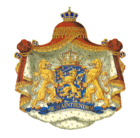Eerste Kamer
|
|
| Monarchy |
| First Chamber Second Chamber Cabinet |
| Prime Minister |
| Political parties |
| Elections |
The Eerste Kamer (literally First Chamber in Dutch) is the Upper House or Senate of the Netherlands parliament, the Estates-General. It was established in 1815 when the Netherlands and Belgium emerged as a single state at the end of the Napoleonic wars and continued after Belgian independence in 1830.
It currently has 75 members, elected indirectly by 12 provincial councils every four years. Unlike the politically more significant Tweede Kamer, its members tend to be part-time politicians at the national level, often having other roles. It has the right to accept or reject legislative bills, but does not have the right of amendment.
Its membership (2003) is:
| Christen Democratisch Appèl (CDA) | 23 |
| Partij van de Arbeid (PvdA) | 19 |
| Volkspartij voor Vrijheid en Democratie (VVD) | 15 |
| GroenLinks (GL) | 5 |
| Socialistische Partij (SP) | 4 |
| Democraten 66 (D66) | 3 |
| ChristenUnie (CU) | 2 |
| Staatkundig Gereformeerde Partij (SGP) | 2 |
| Lijst Pim Fortuyn (LPF) | 1 |
| Onafhankelijke Senaatsfractie (OSF) | 1 |
External links
- Eerste Kamer (in English) (http://www.eerstekamer.nl/9324000/1f/j9vvgh5ihkk7kof/vgipcmqcxiu2)
- Eerste Kamer (in Dutch) (http://www.eerstekamer.nl/)nl:Eerste Kamer der Staten-Generaal

